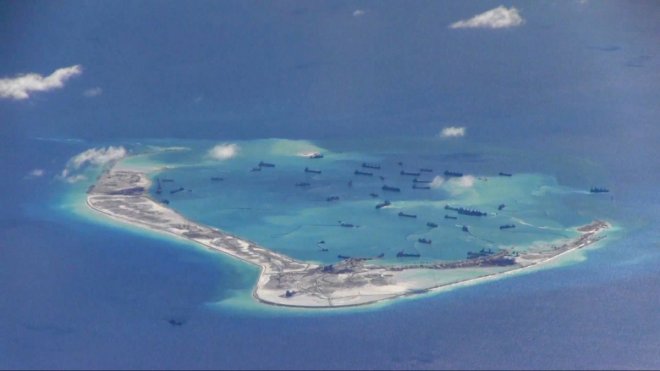
Philippines's remarks about concerns for ASEAN regarding Chinese stance on South China Sea do not represent the bloc, a foreign ministry official of China said on Wednesday (Feb 22).
The world's second largest economy also said it is looking to strengthen its relations with Singapore, another strong member of the regional association.
China said it looks to work with the ASEAN to complete the draft of a framework of the Code of Conduct in the South China Sea (COC) before midyear, the ministry spokesperson Geng Shuan said.
At a meeting hosted by the Philippines on Tuesday, ASEAN foreign ministers called for the "full and effective implementation" of the 2012 Declaration on the Conduct (DOC) of Parties in the South China Sea, Xinhua noted in its report on Wednesday.
Geng dismissed Philippine Foreign Secretary Perfecto Yasay's remarks about concerns raised by ASEAN over China in the South China Sea, saying "such comments were only his opinion and does not represent the view of ASEAN as a whole."
He urged Yasay to follow President Rodrigo Duterte's policies to improve China-Philippine relations and work with China to resolve the South China Sea disputes through friendly talks.
Yasay said Tuesday that Southeast Asian countries see China's installation of weapons systems in the South China Sea as very unsettling and want to prevent militarization, according to media reports.
Representatives of China and ASEAN will gather in Bali, Indonesia, on Monday to discuss the implementation of the DOC, maritime cooperation and negotiation of the COC.
China-Singapore
China and Singapore will hold a series of meetings in Beijing on February 27, discussing cooperation projects and mapping out the future of bilateral relations, Xinhua reported.
Singapore Deputy Prime Minister Teo Chee Hean, invited by his Chinese counterpart Zhang Gaoli, will visit China from Feb. 26 to March 1 and, with Zhang, will co-chair the 13th meeting of China-Singapore Joint Council for Bilateral Cooperation, a high-level institutional mechanism established in 2003 to oversee the entire range of bilateral cooperation.
The two officials will also preside over the 18th China-Singapore Joint Steering Council Meeting for the Suzhou Industrial Park, the ninth China-Singapore Joint Steering Council Meeting for the Tianjin Eco-city, and the first China-Singapore Joint Steering Council Meeting for the Demonstration Initiative on Strategic Connectivity in Chongqing.
Geng hailed Singapore as an important member of the ASEAN, adding that China highly valued relations with Singapore, and was ready to further strengthen their mutual trust and pragmatic cooperation.
Cambodian Cooperation
Cambodian and Chinese officials met in Phnom Penh on Wednesday to devise plans for cooperation under the framework of the China-proposed Belt and Road Initiative, Xinhua reported.
The Cambodian delegation was led by Economy and Finance Ministry Secretary of State Vongsey Vissoth, while the Chinese side was headed by Xiao Weiming, deputy director of the western development division of the China's National Development and Reform Commission.
According to a statement from the Ministry of Economy and Finance, the meeting came after the two countries signed a Memorandum of Understanding on the implementation of bilateral cooperation under the Belt and Road Initiative during a visit of Chinese President Xi Jinping to Cambodia in October 2016.
The Silk Road Economic Belt and the 21st Century Maritime Silk Road initiative, proposed by China in 2013, aims to build a trade and infrastructure network connecting Asia with Europe and Africa along the ancient trade routes.
"Cambodia highly values the bilateral cooperation between the two countries under the Belt and Road Initiative," Vissoth said, adding that the cooperation would provide great benefits to Cambodia in socio-economic development for medium and long terms.
He said the cooperation under the initiative would play a role as the new engine of growth for the region and the world, and benefit both China and the participating countries.
According to the statement, cooperation under the Belt and Road Initiative would focus on seven priority sectors: infrastructure, agriculture, capacity building, special economic zone development, culture and tourism, finance, and eco-environmental protection.
The drafted plans for bilateral cooperation would be submitted to the governments of the two countries for approval in May.








